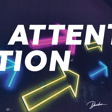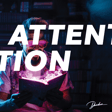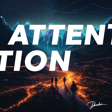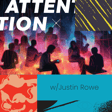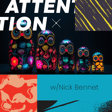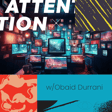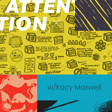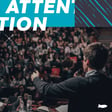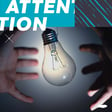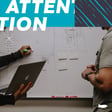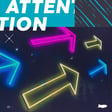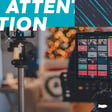Become a Creator today!Start creating today - Share your story with the world!
Start for free
00:00:00
00:00:01

The Systems You're Lacking to Scale Audience Growth w/Lisa Hackbarth
Transcript
Introduction to Attention Podcast
00:00:03
Speaker
Welcome back to the Attention Podcast, where you can learn how to gain and retain the attention of your buyers to build an audience.
Scaling Audience Growth with Lisa Hackbarth
00:00:11
Speaker
I'm Dan Sanchez with Sweetfish, and today I interviewed Lisa Hackbarth, who is the senior marketing campaign manager at Chaos Search about the systems you're lacking to scale audience growth.
Lisa's Journey from Business Owner to Marketer
00:00:23
Speaker
In the interview, we cover how her journey as a small business owner impacted her content marketing, what processes she used to now deliver key results regularly, and the book that changed the game.
00:00:37
Speaker
for how she approaches processes.
New Trends and Insights in Podcasting
00:00:40
Speaker
As it's becoming the new trend in this podcast, stick around until the end to hear what got my attention and what I plan to implement for the show.
Impact of 'E-Myth' on Marketing Strategies
00:00:51
Speaker
Lisa, welcome to the show. Thank you. I'm so excited to be here. In our pre-interview, you mentioned one of my favorite books, probably favorite all-time business books. And I know you're a fan of this book as well, and that's the E-Myth.
00:01:06
Speaker
And I wanted to have a conversation with you about how this book has impacted your marketing. Because I know anytime you've read the E-Myth, you know about like creating a world-class business and it's very systems and process oriented book, right? While it's written for entrepreneurs, I find that it has like, I don't know, you can probably apply the kind of thinking to any job placement, any company for any employee. So I love to hear about how marketers apply this to their craft.
From Photographer to Marketer: Lisa's Transition
00:01:33
Speaker
Because if we can set a process for achieving great results, then those are processes I want to see. I'm always curious to see what other people are doing. So can you tell me and the audience about what you've been able to apply, what you've learned from this book and how you've applied it to marketing and audience growth yourself and your own company?
00:01:52
Speaker
Yes.
Systems in Creative Industries
00:01:53
Speaker
Awesome. Yes, of course. So, yeah, I actually came across the book when, in a former life, I was a photographer. When I had my son, who's now 15, I got into photography just kind of to have something to do, you know, at home on the side, make a little extra cash and ended up discovering kind of that
00:02:12
Speaker
I didn't love being like a mom photographer. I felt like I was getting kind of bored with that. So when I was looking to take my business to the next level and actually become a professional photographer and really, you know, kind of
00:02:28
Speaker
elevate my business. I was going to wedding shows and things like that. I came across this book and I really feel like it did change me from that mom photographer into a professional photographer. And it really was because I think I discovered, I think when you're in an artsy industry and I think it goes for photography and also marketing, that we can kind of get caught up in the
00:02:52
Speaker
Like, I need to be creative and I need, you know, we always think of like Mad Men and how it's like drinking whiskey and coming up with creative ideas, but there's so much more to the work that has to do with business and process and things like that. So I think when I discovered the E-Myth, it was, you know, I went from like being precious about my art and following my gut and really
00:03:17
Speaker
figuring out repeatable ways that I could do the things that I had to do to make my business successful and not leave it up to memory and have to remember to reach out to a client. So I worked on implementing automation to serve my clients better. I got contracts set up automatically.
00:03:36
Speaker
reminders, I worked on process for photograph delivery. So I think I took those lessons when I came back as my son got a little older and I got back into marketing as a full-time role that, you know, I really, I thought about the
Automation and Processes in Client Services
00:03:53
Speaker
What the EMAS taught me was really taking the basics and I almost think of it like back in fifth grade when I was in basketball and my coach, it was like in fifth grade, all you did was like learn how to dribble and pass.
00:04:09
Speaker
you know and do layups and it was it kind of seemed boring but then as I went through you know I've played all the way through high school it's like you have to have those fundamentals in place so that you can get to the fun stuff and the creative stuff and the plays and working together and that's really how I see
00:04:28
Speaker
the lessons from that book. We're teaching you just get the fundamentals down. It's kind of like this year I've really been focusing on the book Atomic Habits. I think we may have talked about this on LinkedIn, but it's really just like getting all of those fundamentals in place, getting those really good habits in place so that all the basics are handled, they're taken care of. You can kind of almost do them without thinking, ideally automating
Consistent Client Experiences: Inspired by 'E-Myth'
00:04:53
Speaker
them.
00:04:53
Speaker
And in the case of the E-Myth, he talks about if you're McDonald's, you want to figure out a process to make the burgers and do all those kind of basic things, and then hire the cheapest person to do them. So in marketing within a department, that might be, hey, we have an intern coming in. Are there some basic things that we can't quite automate with a computer, but they're more simple.
00:05:20
Speaker
break down what we need to do into these simple forms, can we have someone handle those basic things which leaves the, you know, trying to think of the word, but, you know, the people with more experience to, you know, have more free time to be able to do the creative stuff and to be thinking through strategy and, you know, pulling everything all together. So, yeah, that's really, I think that
00:05:44
Speaker
I know that was a lot, but yeah, it was really foundational, I think, for me in figuring out all those kind of basics and learning how to pull plays together, you know, getting to the good stuff, getting all that stuff,
Systems Thinking: From Photography to Marketing
00:05:57
Speaker
so you don't have to think about it, and getting to the good stuff.
00:06:01
Speaker
man, it makes a lot of sense that a photographer would be able to get so much out of the book. I wish more photographers would actually read that book because I feel like a lot of them, they would go from kind of making it, making a few thousand bucks here and there to really grow any actual business. You would start to realize that
00:06:21
Speaker
you really want to create a world-class experience, right? We all talk about customer experience and how important that is, but like very few photographers actually, like there's one thing I know photographers could do, but it would require executing the same way every time. Like if you can send the bride, if it's a wedding or the mother, if it's a family shoot or the person, you're taking a number of photos every photo session, right? But if you could send them one or two,
00:06:48
Speaker
edited photos within 24 hours when it's still fresh in their minds. And of course, you have a whole catalog that it takes time to go through. And it's a lot of work just to get the two done and select and find the two that are interesting. But to think about how much more they're going to enjoy and share it and then it's going to promote your business more to be able to put in the little extra effort in executing right after the thing's done.
00:07:13
Speaker
Well, and a lot of it had to do with the experience, too. Like, you think about the client experience, and I think it's the same for most businesses, but especially that photography where it's so client facing. But in the book, too, one of the big lessons was that if you... And this was something I prided myself on, was, yeah, like, getting them that sneak peek, like, right away. Like, before they're even in bed, you know, get home, grab a couple pictures, and really, like, knock their socks off, they can share it.
00:07:40
Speaker
Facebook, it's so exciting. But if you do that once for one person and then she goes and tells her friend, you know, like, hey, my photographer got me this Seag peak right after and it was so incredible. And then I don't do it for the next person. That's almost worse. So it's like also being consistent with that experience so that you're, you know, you're setting the expectation because it could be even a repeat client who's so excited about that and you don't do it. And then they're like, what? That was even worse.
00:08:13
Speaker
Or he gives an example like a little story in the book where he goes to a barber shop and the barber he talks about how the first time this client goes to the barber shop they have a fantastic experience they wash the hair he hands them a glass of wine or bourbon or something interesting or some
00:08:28
Speaker
to sit while they're waiting. He's playing music. And the next time he goes and they doesn't give him the glass of wine, but he still washes the hair and is an enjoyable barber or whatever. And then the next time they goes, it's a different experience, still great, but it's different. And he ends up walking away disappointed because he came back the second time because he enjoyed the first time, having the expectation that he would go through the exact same process.
00:08:56
Speaker
right so it's not about just creating great experiences but recreating it to the exact degree so that when they refer it to a friend that friend knows exactly what to expect because the other person the refer for furry has been talking it up about how it was so great and they did this and this and then when it doesn't match up that's when
00:09:17
Speaker
Well, it doesn't work out as well. So to think about how that applies to photography, I'm like 100%. And with most photographers, they're usually missing all of that, which is why some people like working with, I don't know, I think Bella is a big photography studio, right? That kind of sets some of those processes in place and works with a bunch of contract photographers to streamline
Creating Processes in Content Marketing
00:09:38
Speaker
that experience a little bit, right?
00:09:40
Speaker
but now we're not in photography anymore, you've come into marketing. So now that you have this mindset for creating great systems and executing world-class business stuff over and over again, how has that kind of mindset translated into what you're doing as a marketer?
00:09:57
Speaker
Yeah, so I think for me, it was bringing in just the idea of systems and having systems and processes. Yeah, so I think, you know, coming into marketing, the things I learned from the book translated because it's like the importance of systems, but realizing like I, I'm a very, I don't know if you know the Enneagram, but I'm an Enneagram 9.
00:10:19
Speaker
And it's like, you know, very, I don't know, just I want to kind of be free. I don't want to be nailed down. I don't want, I kind of hate habits. Like they're, they seem like a waste of time to me. So it's, you know, realizing that systems when you have those in place, it creates an ease that gives you more freedom. So I think it's like that misconception.
00:10:39
Speaker
that if you're going to do something that's a process that your job is going to become this like mundane robotic repeating thing when really it's like, let's get the basics done so that we have more time to do the creative stuff. So for me, systems really are the foundation that gives you freedom to be creative. And so I think about like,
00:11:01
Speaker
the importance of process. Like if you think about taking, let's say you have a great conversation with a colleague and you come up with an idea, but you don't have a process to put it into your flow, you're not going to move that idea forward. If you don't book it in, if you don't say, hey, who's responsible for this? When does it do? Who's taking all the pieces? You know, that kind of thing. So it's like you need those foundational things to move
00:11:25
Speaker
conversations into starting a process, taking an idea, creating a plan, taking the plan and making messaging, creating what are we going to say? How does it tie into the business and what we're trying to communicate to our audience? Every step of the way, there's moving things along from idea to messaging to content to promotions.
00:11:51
Speaker
And if you're missing the process behind any of that, it's, well, one, it's kind of like when you start a new job and it's like everything is hard, you know, because you're, you're coming up with it on the spot and it just takes so much mental energy. It's like when you're traveling and everything is new, it's like your brain just is like tired because you're trying to take it all in.
00:12:12
Speaker
So it's really, I think, taking the lessons I learned, bringing them into marketing, it's really the same thing about just how can I be systematic about what needs to be done. But then within those frameworks, it's still coming up with like creative calls to action and how can I work a pun into this?
00:12:32
Speaker
You know, what can we do that's unique that we haven't seen before? But it's still, you know, it's going to show up as an ad or it's going to show up as a mailer to somebody's door. So there's kind of that framework of the pieces that you need, the sizes of the ad that you need, how long a subject line can be.
Checklists: Boosting Marketing Efficiency
00:12:50
Speaker
But then within that, it's like the better you get at your craft, the more you can be creative. And that's where I think for me, that's where I have I have fun.
00:12:59
Speaker
of all the different processes you've created to make it easier to create content, which one kind of like gives you the most? What process saves you the most time?
00:13:09
Speaker
It's hard to pick one because for anybody that knows me and all my coworkers would tell you, and I'm actually officially an Asana ambassador and I don't make commission, but I'm such a fan of their product that I tell everyone about it and I bring it into every role I'm in. Literally my last job, I said, I won't work here unless we bring in Asana.
00:13:34
Speaker
It's hard to pick one because I really create processes and templates around everything. We can grab an example. If I'm running a webinar, there's literally a 73-point checklist that has to happen every time.
00:13:52
Speaker
Every time we start a new webinar, I take that template and create a new project and then it's just like assigning dates and faces. So, you know, thinking back to when I started my career and every time I would do a webinar, it was like, oh, and I guess we should send an email.
00:14:10
Speaker
Oh, and I guess I need to set up a meeting to talk about it before the call, you know, so it's really like, just takes all the guesswork out of it. And I always say anything that you want done has to have a date and a face. So, you know, but and I just think about I mean, I don't know, hundreds of hours, I've probably saved just not having to think about all those things every single time.
00:14:33
Speaker
So checklists, checklists is the thing, right? Which is a huge, huge piece to make companies run more efficiently. If we didn't have checklists, doctors would amputate the wrong arm sometimes and they fricking have for lack of checklists, right? I don't know. Have you read the book, The Checklist Manifesto? No, but someone recommended it to me. It's like a whole book on the topic. Yeah.
00:14:55
Speaker
It's one of the case studies they give where the surgeon who, the nurse knew they were operating on the wrong arm, but because it was like a certain surgeon and the nurses have never challenged the surgeon, he ended, or he operated on the wrong part of the body or did something horrific. And you're just kind of like, wow, checklist, powerful as heck. What checklist do you find you use the most often for content creation?
00:15:22
Speaker
Yeah, I think and again, it's hard to say because we have a lot of them. So it really just depends on what it is like when I I worked with you guys at Sweetfish and definitely have the the podcast checklist, you know, and then just depending on you know, for example, we have a white paper checklist where
00:15:40
Speaker
you know, it goes through the whole flow between coming up with the ideation, having the SEO person look at keywords, working with a writer. So it's really just, you know, spelling out every single thing that has to happen through the creation. And then in my role, what I really actually enjoy is I always think of the role as an integrated marketer as sort of like a hub where you get to touch all the pieces within marketing, which I really like.
00:16:10
Speaker
So it's from the, you know, coming up with the idea and really now that I'm more experienced, I like it even more because it's like you really get to step back before we even start something and say, like, why are we doing this? Who are we talking to? What do they care about?
00:16:27
Speaker
So kind of taking the ideas and making sure we're on target before we even start. But then it's like taking all the pieces of the people and the infrastructure that need to go into that piece of content. So not only the copy, but we're going to have to create graphics and everything else that goes into creating something. And then we're able to distribute it. So it's like coming up with maybe derivative content, coming up as you know with podcasts.
00:16:56
Speaker
taking a short little clip and creating a social media short version that maybe has just like a little nugget within it that you can take that short piece and put that out on social. And then all the other ways that you can promote it to get attention to it. So I need to get ads created. I need to get
00:17:18
Speaker
you know, the YouTube version. So getting ads created and, you know, kind of pulling it all together and then getting eyeballs on it. So, you know, and all of that goes into that, the process, the checklist to pull it all together.
Continuous Improvement in Marketing Processes
00:17:34
Speaker
With all these checklists in place, how do you stay nimble enough to adapt since things and like, I don't know, I feel like things change faster and faster. How are you staying up with the times?
00:17:46
Speaker
Yeah, so I think, I mean, the beautiful thing about having a healthy system in place is that you don't miss anything. So one of the things that I think about especially is from the beginning, I'm thinking about at the end, I'm going to need to report on this. So usually as I've learned, if you get to the end of something and you haven't thought about reporting, you're usually going to kind of miss the mark.
00:18:09
Speaker
So it's like having the process built in where before I even send anything out, I'm creating tracking links and things like that. So it's like, you know, the important thing is in the nimbleness, it's as you repeat the process, you see things like that where, you know, if you run the process and you get to the end and then, you know, your VP is like, how did this do?
00:18:33
Speaker
You know when you have that moment of like oh shoot I forgot to give that vendor a special link so I actually don't know what traffic came from them you know I don't know a marketer that hasn't done that so it's creating the process that as you run it you find out like where are the holes.
00:18:50
Speaker
Maybe where can you become more efficient? How can I work with a different person maybe to make it better? Is it getting stuck somewhere that I need to bring in? Maybe it's like it needs executive support, you know, to can make it better or continue moving or get more attention or things like that.
Maintaining and Updating Systems
00:19:08
Speaker
So I think staying nimble is it's just a continuous process of
00:19:13
Speaker
It's not like I will create a template and then that's it. It's locked in stone and we can never touch it again. It's really about when you follow the process, you start seeing where the holes are and where you can improve. And I'm constantly, even in my own life, I'm looking at dumb ways to improve and be more efficient. I just discovered I started taking greens every day.
00:19:38
Speaker
And I read about this from someone who is in the restaurant industry where they... And it's actually like an ADHD hack where if you have something to do and you kind of hate having to do it, a shortcut is to put everything you need in one place. So even if it's kind of like when you travel and you have a travel bag with
00:19:57
Speaker
You know, I own two deodorants. Oh my gosh, I'm an adult. You know, but you just like keep that packed all the time. So it's kind of like if you go to make coffee every day, if you have to go to six different places in your kitchen, it's kind of a pain and it just takes a little bit longer. So if you create like a little coffee area, it's like, ah,
00:20:15
Speaker
I don't know. It just makes life better. So I kind of did that for my healthy stuff because it's like if you take away that friction of having to go get a glass and get the greens and get a spoon and then wash the spoon, you know, it's like all of that. I just left a spoon in the greens canister. I don't know. It's like a dumb little thing, but that's kind of how I think about marketing. It's like, you know, is there a way that I can make this more efficient? Can I create bookmarks? Can I
00:20:42
Speaker
Create templates there's just it's all of those little things that it's like you just take all the start taking all the friction out of your processes. So the I think the nimble piece is that you know as you create a process you look at what's working and as you get more comfy and you're like oh this is something that I can make faster easier better.
00:21:02
Speaker
And so I'll go back and update the template. So the next time, say I start a webinar, it's there for me. And I learned from the last time, and I don't have to think about, what was that thing that made it better? It's right there in the process. But one of the things is you have to keep going back.
00:21:18
Speaker
And it's that maintenance. You have to keep up with it. I suppose it's like someone who's into biking. It's like you have to go clean your bike before the ride to get the best experience. But it's like those little maintenance things you have to do. But then it just makes everything so much better and smoother.
00:21:36
Speaker
makes a ton of sense to me. Essentially, you're making good habits easier, right? I think it's an atomic habit thing, like make the habits that are hard to form a little
Key Takeaways and Conclusion
00:21:46
Speaker
bit easier. It's kind of like if you want to go for a run in the morning, set your clothes out and your shoes out so that you don't have to think about that. You're just eliminating friction for you to go and do that thing that's already a lot of friction, so take out as much friction as you can.
00:21:59
Speaker
So kind of what I'm taking away from this is like, one, you really need to document all the processes that you're currently using for content creation and audience growth. You really need to put them down and document and create the checklist to kind of define a baseline of what's currently going on.
00:22:17
Speaker
And then at least if I'm hearing you correctly, like the next good step people can take essentially is to reduce friction. How could you improve these processes to make it a little bit easier for you handle the people that have to execute it? Can you automate something to bring that thing they had to copy and paste from that one place and just put it right into the note, right? In Asana, right? Which I find I'm doing more and more between HubSpot and Asana trying to automate the two, right? It's just making it slightly more convenient
00:22:46
Speaker
save a little bit of time to do that thing, they probably is extra steps for them to do. So how can you save them some steps? I'm wondering what the third step would be after you've documented it, you've improved it. If maybe every once in a while you just need to go through and take inventory of it, like what do you do to keep all your systems organized?
00:23:07
Speaker
Yeah. So for me in Asana, I mean, well, and there's different ways to tackle it, you know, there's, and that's the hard part almost when you're teaching someone Asana is there's not like one right way. It's kind of like whatever the team finds that works the best. But I think for me, it's really just like kind of, I would say the most important thing is keeping a mentality of I'm responsible for keeping it cleaned up. And it's like, it's like, I always think of it as like a gift that I'm giving to my future self.
00:23:37
Speaker
Not to mention the other people on the team. We just had a new contractor start who's really entrenched in the marketing team. She was like, these systems you have in place makes it so easy to find what I need. So that to me is like if I don't have different people on the team coming to me and asking the same question over and over, it is a gift to myself. It's keeping up with them. Awesome.
00:24:04
Speaker
Lisa, thank you so much for joining me on the Attention podcast. Where can people go to learn more from you and learn more about Chaos Search online? Yeah, so people can connect with me on LinkedIn. Definitely send me a connection request. I love building community there. You can find me at Lisa Hackbarth, L-I-S-A.
00:24:24
Speaker
Hack Barth, H-A-Z-K-B-A-R-T-H. And I'll send you the link to put in the show notes. And then Chaos Search, if you want to learn about us, we are a data lake solution. You can find us at chaossearch.io. Fantastic. Again, thanks for joining me today.
00:24:41
Speaker
Let's talk about what caught my attention in this interview. I love that Lisa pointed out three steps that anybody can take like today to make their lives easier, their work better, and generally allow more mental space for real creative work. I find that a lot of people get hung up on systems because it limits their creative freedom, but I actually think it creates more freedom to think about the things that you can't create systems for.
00:25:10
Speaker
which is critical for the work of growing an audience. So let's review the three-step process she uses. First, she documents the current process that's going on. She loves making checklists in Asana, but there's many ways to do this. I'm actually prone to Asana too. I've been using it a lot even for this very show.
00:25:29
Speaker
Two, to think about how to make it better. Once you've documented the process and actually have a step-by-step list to go through, either step-by-step or just a checklist of things to go through, you can then start taking swings at making it better. It might be little things. It might be big things. You might completely rewrite the process, but you have something to rewrite. That's why starting with step one, documenting what's currently going on is so critical.
00:25:54
Speaker
Step two, again, is thinking how you can make it better, and then three is just updating the document to the new standard, especially if more than you are using this process or practice, but it can obviously start with just you. You don't need to be creating documents for the team in order to get the most out of this.
00:26:11
Speaker
So these three steps, they're so simple, so simple, but you have to ask yourself, how well are you actually doing this? How often are you just thinking about what you're doing rather than thinking about how you're doing it? It's a question you should ask yourself. I know it's a question I'm asking myself right now. What am I currently doing over and over again that I'm not thinking about how I'm doing it? What have I not documented in my own work processes so far that are fairly repetitive?
00:26:40
Speaker
That's the question I'm left with after this interview.


